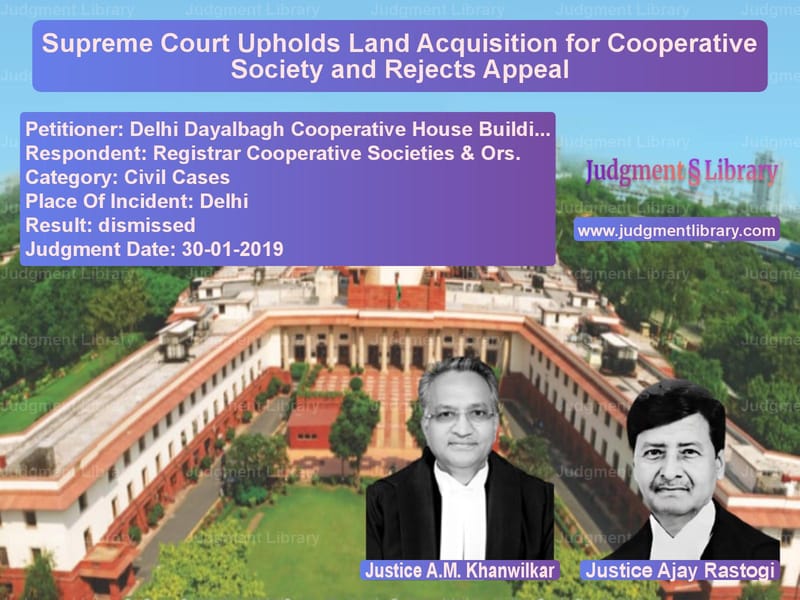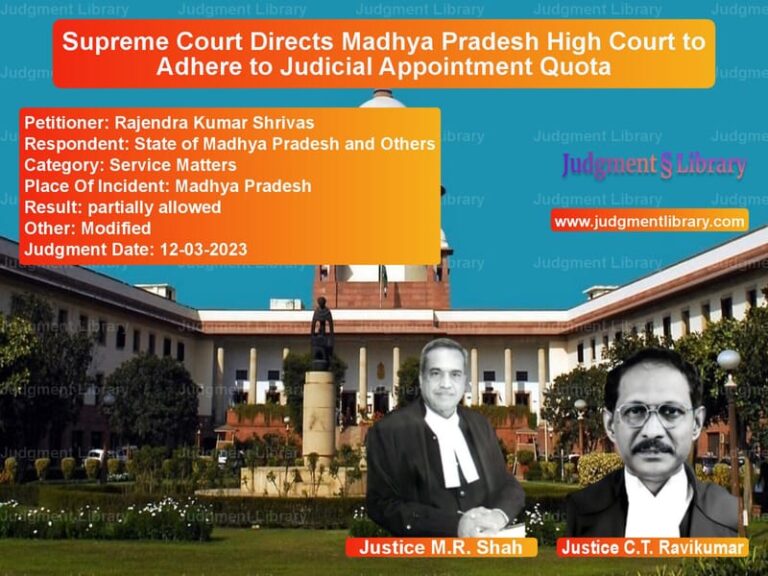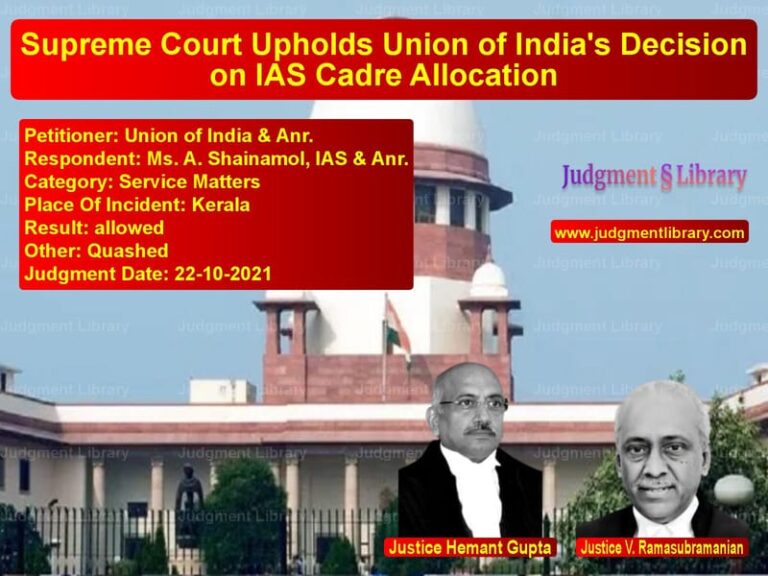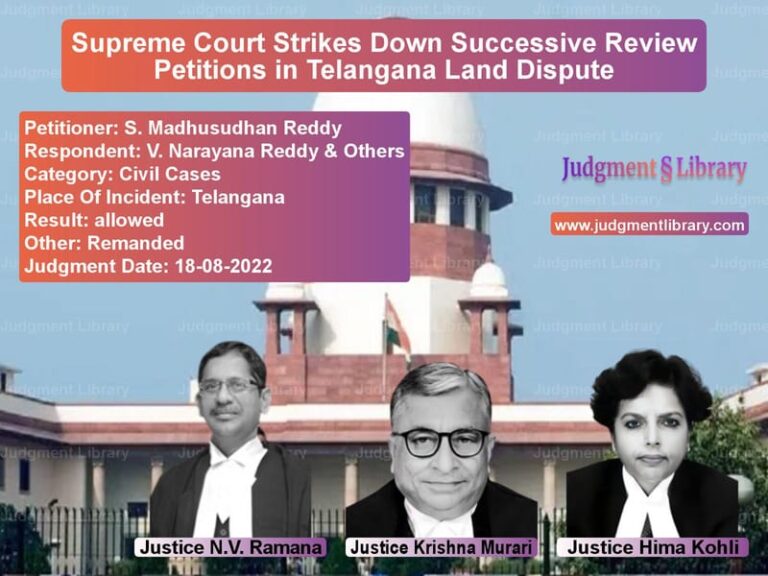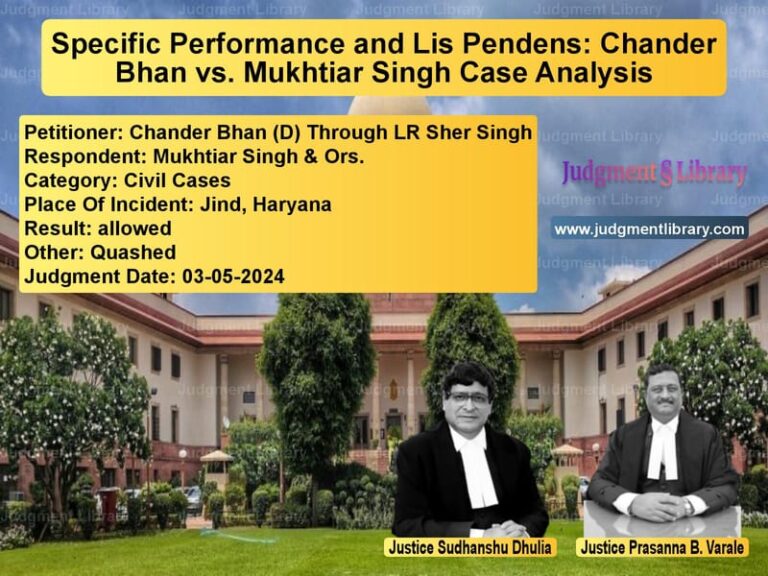Supreme Court Upholds Land Acquisition for Cooperative Society and Rejects Appeal
The case of Delhi Dayalbagh Cooperative House Building Society Ltd. vs. Registrar Cooperative Societies & Ors. involves a long-standing dispute regarding the acquisition of land by a cooperative society and its subsequent sale to individual members. The Supreme Court ruled against the appellant society, affirming that the sale and transfer of plots to non-members could not be challenged under the Delhi Cooperative Societies Act, 2003.
The case raised significant legal questions about the enforceability of cooperative society bye-laws, the application of the Land Acquisition Act, 1894, and whether sales made by members of the cooperative society to non-members violated statutory provisions.
Background of the Case
The Delhi Dayalbagh Cooperative House Building Society Ltd. was established to acquire land and allot plots to its members. The society approached the Delhi government in 1955 to acquire land for its housing project. The acquisition was conducted under Part VII of the Land Acquisition Act, 1894, which permits land acquisition for companies and cooperative societies. An agreement was executed under Section 41 of the Act, and possession of the land was handed over to the society.
Over the years, members of the society started selling their plots to third parties, including non-members. The society objected to such sales, citing its bye-laws that restricted transfers to non-members. The matter escalated when the society sought to invalidate these sales through arbitration and later approached the High Court of Delhi, which ruled against it. The society then appealed to the Supreme Court.
Key Legal Issues
- Whether land acquired under the Land Acquisition Act, 1894, for a cooperative society could be sold by members to non-members.
- Whether the cooperative society’s bye-laws could override statutory provisions permitting transfers.
- The role of Section 91 of the Delhi Cooperative Societies Act, 2003, in regulating membership and property transfers.
- Whether an arbitrator had the jurisdiction to invalidate registered sale deeds.
Petitioner’s (Delhi Dayalbagh Cooperative Society’s) Arguments
The society contended that the sale of plots to non-members was in violation of its bye-laws and the agreement under which the land was acquired. Their counsel argued:
“The society was formed with the specific objective of providing housing to its members. Allowing non-members to purchase plots defeats the purpose of the cooperative movement and violates the conditions of land acquisition.”
The appellant also maintained that the sale of land to non-members without the society’s prior permission contravened its bye-laws and the agreement executed with the government in 1955.
Respondents’ (Registrar Cooperative Societies & Others) Arguments
The respondents argued that the transactions in question were legally valid and not subject to the restrictions imposed by the cooperative society. Their submission was:
“The cooperative society cannot impose restrictions on property transfers beyond what is prescribed in law. The Delhi Cooperative Societies Act, 2003, permits property sales by members, and any restrictions inconsistent with the Act cannot be enforced.”
The respondents also pointed out that the government had transferred possession of the land to the society free from encumbrances, and the society had no right to challenge subsequent sales made by individual members.
Supreme Court’s Observations
The Supreme Court, comprising Justices A.M. Khanwilkar and Ajay Rastogi, held that the society’s arguments were legally unsustainable. The Court ruled:
“The sale transactions were conducted in accordance with the law, and there is no statutory bar on members selling their plots to non-members. The cooperative society’s bye-laws cannot override the provisions of the Delhi Cooperative Societies Act, 2003.”
The Court further emphasized:
“Section 91 of the Delhi Cooperative Societies Act, 2003, recognizes the rights of purchasers to become members of the society upon fulfilling the necessary conditions. The society’s attempt to challenge the sales is contrary to the spirit of cooperative housing.”
Final Judgment
Rejecting the society’s appeal, the Supreme Court ruled:
“The appeals, being devoid of merit, are accordingly dismissed. The society has no legal standing to challenge the sale of plots to non-members, as such transactions are protected under the statutory framework.”
Significance of the Judgment
- Affirmation of Property Rights: The ruling reinforces that cooperative society members have the legal right to sell their properties, subject to statutory provisions.
- Regulatory Clarity: The judgment clarifies that cooperative society bye-laws cannot impose restrictions inconsistent with state laws.
- Judicial Precedent: The decision sets a precedent for future cases involving disputes between cooperative societies and individual members over property transfers.
Conclusion
The Supreme Court’s ruling upholds the rights of property owners within cooperative societies and ensures that land transactions are governed by statutory provisions rather than restrictive bye-laws. This decision strengthens the legal framework for cooperative housing and safeguards the interests of property buyers and sellers alike.
Petitioner Name: Delhi Dayalbagh Cooperative House Building Society Ltd..Respondent Name: Registrar Cooperative Societies & Ors..Judgment By: Justice A.M. Khanwilkar, Justice Ajay Rastogi.Place Of Incident: Delhi.Judgment Date: 30-01-2019.
Don’t miss out on the full details! Download the complete judgment in PDF format below and gain valuable insights instantly!
Download Judgment: Delhi Dayalbagh Coop vs Registrar Cooperativ Supreme Court of India Judgment Dated 30-01-2019.pdf
Direct Downlaod Judgment: Direct downlaod this Judgment
See all petitions in Property Disputes
See all petitions in Contract Disputes
See all petitions in Judgment by A M Khanwilkar
See all petitions in Judgment by Ajay Rastogi
See all petitions in dismissed
See all petitions in supreme court of India judgments January 2019
See all petitions in 2019 judgments
See all posts in Civil Cases Category
See all allowed petitions in Civil Cases Category
See all Dismissed petitions in Civil Cases Category
See all partially allowed petitions in Civil Cases Category

